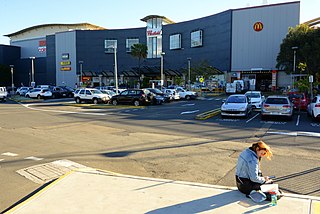
David Jones Pty Ltd, trading as David Jones, is an Australian luxury department store. The brand was owned from 2014 to 2023 by the South African retail group Woolworths South Africa. In December 2022, David Jones was sold to private equity firm Anchorage Capital Partners for approximately $100m.

Woolworths Group Limited is an Australian multinational retail and finance company, primarily known for the operation of its retail chain Woolworths Supermarkets across Australia, Woolworths in New Zealand and its discount department store Big W. Headquartered in Bella Vista, Sydney, it is the largest company in Australia by revenue and number of employees, and the second-largest in New Zealand.

Lowe's Companies, Inc. is an American retail company specializing in home improvement. Headquartered in Mooresville, North Carolina, the company operates a chain of retail stores in the United States. As of Oct. 28, 2022, Lowe's and its related businesses operated 2,181 home improvement and hardware stores in North America.

Hardware stores, sometimes known as DIY stores, sell household hardware for home improvement including: fasteners, building materials, hand tools, power tools, keys, locks, hinges, chains, plumbing supplies, electrical supplies, cleaning products, housewares, tools, utensils, paint, and lawn and garden products directly to consumers for use at home or for business. Many hardware stores have specialty departments unique to its region or its owner's interests. These departments include hunting and fishing supplies, plants and nursery products, marine and boating supplies, pet food and supplies, farm and ranch supplies including animal feed, swimming pool chemicals, homebrewing supplies and canning supplies.

Woolworths was a British high-street retail chain. At its height, it operated as Woolworths Group PLC, which included other companies such as the entertainment distributor Entertainment UK, and book and resource distributor Bertram Books.
Homebase is a British home improvement retailer and garden centre brand trading in the United Kingdom and Ireland. It was founded by British supermarket chain Sainsbury's and retailer GB-Inno-BM in 1979 as Sainsbury's Homebase.
Bunnings Group Limited, trading as Bunnings Warehouse or Bunnings, is an Australian household hardware and garden centre chain. The chain has been owned by Wesfarmers since 1994, and has stores in Australia and New Zealand.
Hardwarehouse was a home improvement chain in Australia. The chain was an offshoot of BBC Hardware, which was owned by Burns Philp and then Howard Smith Limited, and had stores in Australia and New Zealand. It was established by BBC Hardware as a way to implement and develop the adopted hardware warehouse concept which was based on overseas chains B&Q and Home Depot.

Grace Bros was an Australian department store chain, founded in 1885. It was bought by Myer in 1983. There were 25 stores across New South Wales and the Australian Capital Territory plus a few in Victoria, until they were re-branded under the Myer name in 2004.

Wesfarmers Limited is an Australian conglomerate, headquartered in Perth, Western Australia. It has interests predominantly in Australia and New Zealand, operating in retail, chemical, fertiliser, industrial and safety products. With revenue of A$43.5 billion in the 2023 financial year, it is one of Australia's largest companies by revenue. Wesfarmers is also one of the largest private employers in Australia, with approximately 107,000 employees.

Bankstown Central is a shopping centre in the suburb of Bankstown in South Western Sydney.

Mitre 10 is an Australian retail and trade hardware store chain. Operations are based on a cooperative system, where the store owners are members of the national group and each has voting rights. The chain name references the mitre joint. There are over 400 "Mitre 10" and its associated "True Value Hardware" franchises throughout Australia.

Westfield Warringah Mall, previously known as Warringah Mall, is a large indoor/outdoor shopping centre in the suburb of Brookvale in the Northern Beaches region of Sydney.

Coles Group Limited is an Australian public company operating several retail chains. Its chief operations are primarily concerned with the sale of food and groceries through its flagship supermarket chain Coles Supermarkets, and the sale of liquor through its Coles Liquor outlets. Since its foundation in Collingwood, Victoria in 1914, Coles has grown to become the second-largest retailer in Australia after its principal rival, Woolworths, in terms of revenue.

Top Ryde City, previously known as Top Ryde Shopping Centre, is a large shopping centre in Ryde, a suburb of Sydney, Australia. It is owned by Blackstone.
Michael Gerard Luscombe was an Australian businessman. He was the CEO and managing director of Woolworths, the largest retail company in Australia, from 2006 until 2011.
Home Hardware is an Australian retail hardware chain. It is Australia's third-biggest hardware chain after Bunnings and Mitre 10, the latter of which is its parent company.

The Majura Park Shopping Centre, formerly Brand Depot, is a big-box type shopping centre in the district of Majura in Canberra, Australia. It was developed by Canberra Airport as part of the Majura Park precinct. The shopping centre, which opened in 2006, is part of a larger office and retail precinct on the airport's western boundary, adjacent to Majura Road. At the time of opening, the centre boasted Australia's largest Woolworths supermarket. The centre is also anchored by discount department store Big W and Toymate. In addition to the anchor tenants, there are over 30 specialty stores representing a variety of national chains, a 256-seat food court and Lollipop's Playland and Cafe - an air-conditioned, fully supervised children's playground.













